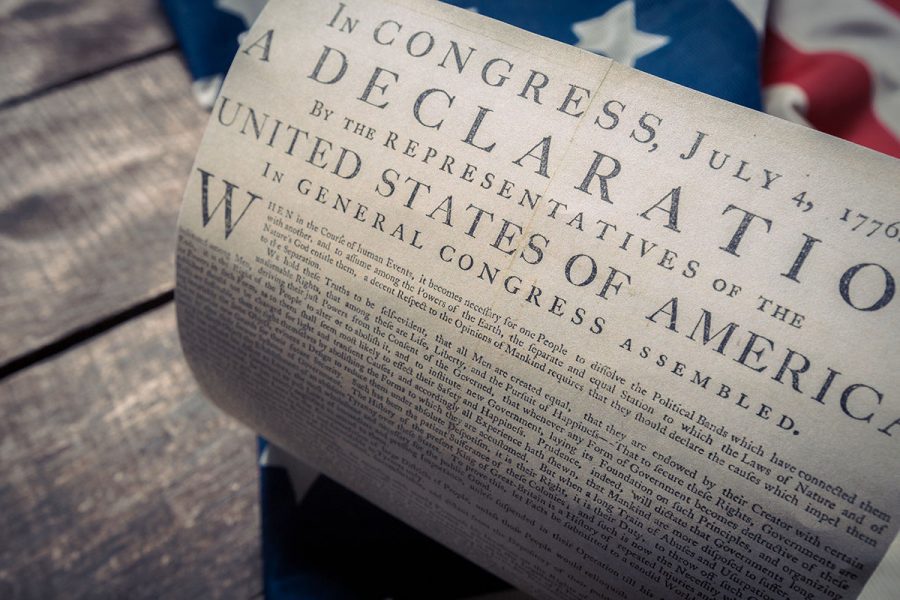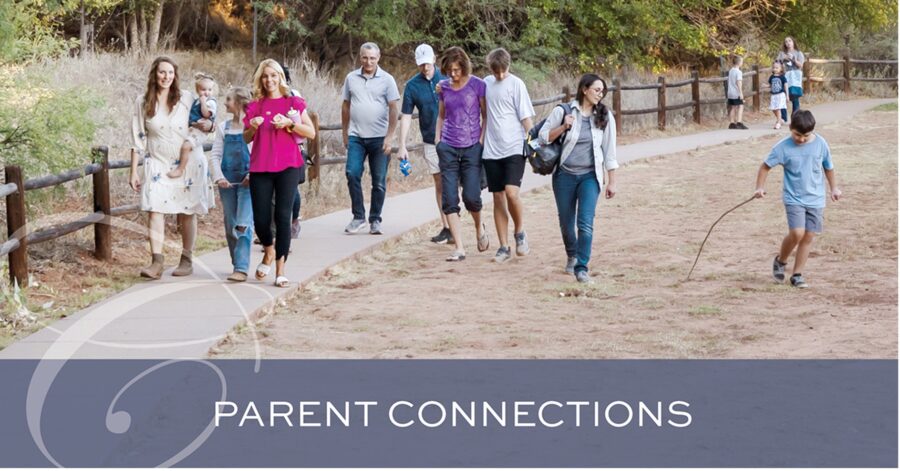On July 4th, and on other American holidays, do we really pause to reflect on our nation’s history? Too often, for my family, these holidays have become a day of swimming, grilling, and fireworks—activity without reflection.
Intentional July 4th Traditions
Recently, I read Laura Ingalls Wilder’s Little Town on the Prairie to my children, and it completely changed my thinking about the Fourth of July and how we celebrate the occasion.
Consider this passage from the story in which a local politician is chosen to read the entire Declaration of Independence to the crowd:
Laura and Carrie knew the Declaration by heart, of course, but it gave them a solemn, glorious feeling to hear the words. They took hold of hands and stood listening in the solemnly listening crowd. The Stars and Stripes were fluttering bright against the thin, clear blue overhead, and their minds were saying the words before their ears heard them. (p. 73-74)
As I read this passage to my family, I realized that these pioneers took it for granted that the Declaration of Independence would be read in its entirety every July 4th. More than that, they assumed that everyone in the crowd had it memorized and would be silently reciting the words along with the reader.
Having this annual celebration and a shared cultural document makes this a crowd of ardent patriots, binding them together in a unified community. The same happens for Classical Conversations Foundations students in Cycle 3 as they memorize the presidents, the Preamble to the Constitution, and the Bill of Rights.
In Little Town on the Prairie, Laura’s father leads the town in singing “My Country ‘Tis of Thee” at the end of the reading.
Similarly, years ago my own Classical Conversations community used some of our opening time during Cycle 3 to teach students all four verses of “The Star-Spangled Banner,” “America the Beautiful,” “God Bless America,” and “My Country ‘Tis of Thee.”
We worked on each song for six weeks in opening and then sang them for parents and grandparents at our closing program.
Related: “The Search for the Best Homeschool History Curriculum”
Fourth of July Grammar and Dialectic
For Laura Ingalls Wilder, the combined reading of the Declaration of Independence and the singing of “My Country ‘Tis of Thee” sparked new thoughts about freedom as she contemplated words which were old and familiar:
The crowd was scattering away then, but Laura stood stock still. Suddenly she had a completely new thought. The Declaration and the song came together in her mind, and she thought: God is America’s king. She thought: Americans won’t obey any king on earth. Americans are free. That means they have to obey their own consciences. No king bosses Pa; he has to boss himself. Why (she thought), when I am a little older, Pa and Ma will stop telling me what to do, and there isn’t anyone else who has a right to give me orders. I will have to make myself be good. Her whole mind seemed to be lighted up by that thought. This is what it means to be free. It means, you have to be good. ‘Our father’s God, author of liberty’—The laws of Nature and of Nature’s God endow you with a right to life and liberty. Then you have to keep the laws of God, for God’s law is the only thing that gives you a right to be free. (p. 76-77)
This transition for Laura is a perfect illustration of a child moving from practicing grammar (memorizing and reciting songs and the Declaration) to practicing dialectic. Her solid foundation in American history gave her a firm basis for later thinking big thoughts about the idea of freedom. She reasons out the source of freedom and rightly draws conclusions about both the liberties and the restrictions of handling freedom properly.
Resources: The American Experience Sourcebook
Words Aptly Spoken: American Documents
Lay a Foundation in American History this July 4th
Give your student this same foundation as you explore American history. Plan to read many great stories of American pilgrims and patriots and to learn from both their triumphs and their mistakes. Read and discuss great American speeches and poems, such as those in Words Aptly Spoken: American Documents. Encourage your student to memorize some of these speeches to deliver as presentations.
Hopefully, you’ll discuss big ideas such as the rights and responsibilities of virtuous citizens.
Those are the long-term goals. In the short-term, you can revamp your July 4th celebration to include a reading of the Declaration of Independence in its entirety with friends or family. If your family is talented musically, you can sing patriotic songs around the piano.
And perhaps, before sending fireworks into the night sky, hold a time for thanksgiving and prayer, remembering these words:
We hold these truths to be self-evident, that all men are created equal, that they are endowed by their Creator with certain inalienable Rights, that among these are Life, Liberty, and the pursuit of Happiness . . .





